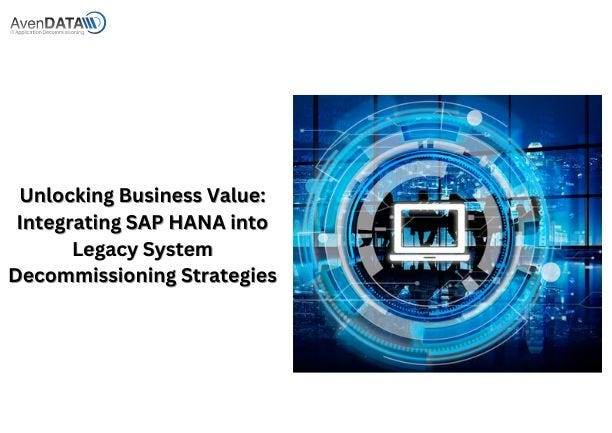Unlocking Business Value: Integrating SAP HANA into Legacy System Decommissioning Strategies

In the ever-evolving landscape of enterprise technology, SAP HANA stands out as a transformative force, revolutionizing data management and analytics. As organizations seek to modernize their IT infrastructure and optimize operational efficiency, the integration of SAP HANA into legacy system decommissioning strategies emerges as a pivotal step forward. In this blog post, we explore how leveraging SAP HANA can unlock significant business value and streamline the process of legacy system decommissioning.
Understanding Legacy System Decommissioning
Legacy systems, characterized by outdated technology and limited scalability, often pose significant challenges to organizations. They hinder agility, impede innovation, and incur high maintenance costs. Legacy system decommissioning involves retiring these outdated systems in favor of modern solutions that better align with business needs. However, the process is complex and requires careful planning to ensure a smooth transition while mitigating risks.
The Role of SAP HANA
SAP HANA, an in-memory database platform, offers a comprehensive suite of capabilities that empower organizations to overcome the obstacles associated with legacy systems. Its advanced analytics, real-time processing, and data management functionalities provide a solid foundation for driving digital transformation initiatives. By integrating SAP HANA into legacy system decommissioning strategies, organizations can realize several key benefits:
- Enhanced Performance: SAP HANA’s in-memory computing enables lightning-fast data processing, significantly improving system performance and user experience.
- Advanced Analytics: Leveraging SAP HANA’s analytical capabilities allows organizations to gain deeper insights from their data, enabling informed decision-making and strategic planning.
- Data Consolidation: SAP HANA’s ability to consolidate data from disparate sources facilitates the migration of legacy system data, streamlining the decommissioning process.
- Cost Savings: By retiring outdated legacy systems and consolidating onto the SAP HANA platform, organizations can reduce maintenance costs, optimize resource utilization, and achieve significant cost savings in the long run.
- Scalability and Flexibility: SAP HANA’s scalable architecture ensures that organizations can accommodate growing data volumes and evolving business requirements, future-proofing their IT infrastructure.
Key Considerations for Integration
While the benefits of integrating SAP HANA into legacy system decommissioning strategies are compelling, organizations must approach the process strategically. Here are some key considerations to keep in mind:
- Comprehensive Assessment: Conduct a thorough assessment of existing legacy systems to identify opportunities for decommissioning and determine the feasibility of migrating data to SAP HANA.
- Data Migration Strategy: Develop a robust data migration strategy that prioritizes data integrity, security, and compliance throughout the transition process.
- Change Management: Implement effective change management practices to ensure seamless adoption of SAP HANA across the organization and minimize disruption to business operations.
- Training and Education: Provide adequate training and education to users and stakeholders to maximize the benefits of SAP HANA and facilitate a smooth transition.
- Risk Management: Proactively identify and mitigate potential risks associated with the integration of SAP HANA, including data security vulnerabilities, system compatibility issues, and performance concerns.
Conclusion
In conclusion, integrating SAP HANA into legacy system decommissioning strategies offers organizations a unique opportunity to unlock business value, drive innovation, and position themselves for long-term success in the digital era. By leveraging SAP HANA’s advanced capabilities, organizations can streamline the decommissioning process, enhance operational efficiency, and gain a competitive edge in today’s dynamic business landscape. Embracing SAP HANA as a foundational element of legacy system decommissioning strategies is not just a technological imperative; it’s a strategic imperative for organizations looking to thrive in the digital age.
